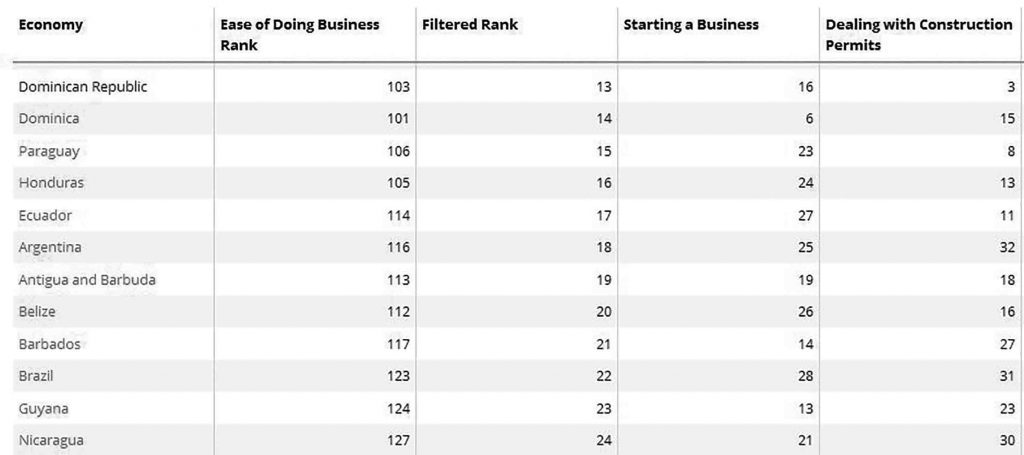Home News Guyana’s ‘doing business’ ranking increases
Guyana has climbed 16 places on the recently-released World Bank’s Ease of Doing Business ranking for 2017, which is partly being attributed to major reforms at the Lands and Survey Commission and the operationalisation of the Credit Bureau.
The World Bank publication titled “Doing Business 2017” stated that out of the 190 countries, Guyana is now ranked 124, compared to its previous ranking of 140.
New Zealand topped the rankings, followed by Singapore.
While Guyana has moved up in the global rankings, it stands as the second lowest ranked Caribbean country only above St Vincent and the Grenadines.
Guyana stands some 57 places behind Jamaica which leads the region at 67, followed by St Lucia at 86, Trinidad and Tobago at 96, Dominica at 101, The Dominican Republic at 103, Antigua and Barbuda at 117, and The Bahamas at 121.
According to the report, Guyana’s improved ranking was built on the fact that the country made registering property easier by increasing the transparency of the Lands and Survey Commission and improved access to credit information by expanding the coverage of the credit bureau.
The report stated that Guyana and Tanzania made the largest improvements by expanding borrower coverage.
It said the East African country’s credit bureau, Creditinfo, expanded its borrower coverage from 4.97 per cent to 6.48 per cent of the adult population.
“Similarly, Creditinfo Guyana, which became operational in May 2015, expanded its borrower coverage from 2.40 per cent to 16.40 per cent of the adult population through obtaining data from one microfinance institution, one trade creditor and one water utility company as well as from six private commercial banks,” the report stated.
It said Guyana expanded the number of borrowers listed by its credit bureau with information on their borrowing history from the past five years to more than five per cent of the adult population.
Doing Business measures aspects of regulation that affect small and medium-size enterprises, operating in the largest business city of an economy across 11 areas; 10 of which are included in this year’s ranking on the Ease of Doing Business.
These areas include starting a business, dealing with construction permits, getting electricity, registering property, getting credit, protecting minority investors, paying taxes, trading across borders, enforcing contracts, and resolving insolvency.
Doing Business also measures features of labour market regulation, which is not included in the ranking. Data in Doing Business 2017 are current as of June 1, 2016.
The indicators are used to analyse economic outcomes and identify what reforms of business regulation have worked, where and why.
Earlier this month, the Business Ministry in Guyana said it was “quietly” engaging the World Bank International Finance Corporation (IFC) team for assistance in crafting a doing business reforms agenda which would see the Ministry taking definitive measures to improve Guyana’s ranking in the doing business index.
In April of this year, a World Bank IFC team visited Guyana at the invitation of the Ministry and met with stakeholders of both the Private and Public Sectors.
“Those engagements led to an ICT assessment report, a review of laws and regulations that pertain to doing business in Guyana as well as recommendations for short-term reforms,” the Ministry had said.
It added that two of the short-term recommendations that were implemented involved placing information on the Ministry of Business’ website pertaining to the requirements for obtaining building permits and documents required and fee schedules for property transactions and for accessing maps of land plots. (Edward Layne)












